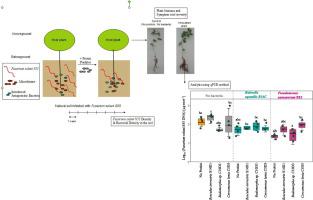Applied Soil Ecology ( IF 4.8 ) Pub Date : 2021-07-23 , DOI: 10.1016/j.apsoil.2021.104158 Ameni Bahroun 1, 2 , Alexandre Jousset 2 , Moncef Mrabet 1 , Ridha Mhamdi 1 , Haythem Mhadhbi 1

|
Plant health largely depends on root-associated microorganisms that inhibit pathogens. Enriching the rhizosphere microbiome with beneficial bacteria has a high potential of supporting future sustainable food production. However, the introduced microorganisms often show low activity with a low survival rate. We propose to solve this limitation by co-inoculating beneficial bacteria with protists. Free-living protists are one of the main regulators of bacterial activity in the rhizosphere and can increase the density and activity of pathogen-suppressive microbes. We therefore hypothesized that protist-bacteria interactions may serve to enhance plant protection against soil-borne pathogens. We tested whether co-inoculating beneficial bacteria with protists increases plant protection against Fusarium solani S55, a fungal pathogen causing root rot. We inoculated Vicia faba seedlings with the disease-suppressing bacteria Rahnella aquatilis B16C and Pseudomonas yamanorum B12, alone or in combination with three different bacterivorous soil protists, Rosculus terrestris S14D1, Bodomorpha sp. C10D3 and Cercomonas lenta C5D5. We grew plants in Fusarium-infested soil and recorded the effect of inoculation on disease severity and pathogen density. We demonstrated that introduced bacteria and protists synergistically impact plant health. When introduced alone, both bacteria and protists provided a partial protection against Fusarium rot. Protists further modulated the performance of the bacteria in an idiosyncratic way, with some combinations offering an almost complete Fusarium solani S55 suppression.
These results suggest that protists could form the base of a new generation of biological control strategies of soil-borne diseases, either as a standalone inoculant or as an enhancer of beneficial bacteria.
中文翻译:

原生生物通过有益细菌调节镰刀菌根腐病抑制
植物健康在很大程度上取决于抑制病原体的根相关微生物。用有益细菌丰富根际微生物群落具有支持未来可持续粮食生产的巨大潜力。然而,引入的微生物往往表现出低活性和低存活率。我们建议通过将有益细菌与原生生物共同接种来解决这一限制。自由生活的原生生物是根际细菌活动的主要调节剂之一,可以增加病原体抑制微生物的密度和活性。因此,我们假设原生生物-细菌相互作用可能有助于增强植物对土壤传播病原体的保护。我们测试了将有益细菌与原生生物共同接种是否会增加植物对茄病镰刀菌的保护S55,一种引起根腐病的真菌病原体。我们用抑制疾病的细菌Rahnella aquatilis B16C 和Pseudomonas yamanorum B12 单独或与三种不同的食菌土壤原生生物Rosculus terrestris S14D1和 Bodomorpha sp一起接种蚕豆幼苗。C10D3和Cercomonas lenta C5D5。我们在镰刀菌感染的土壤中种植植物并记录接种对疾病严重程度和病原体密度的影响。我们证明引入的细菌和原生生物协同影响植物健康。单独引入时,细菌和原生生物都提供了部分保护镰刀菌腐烂。原生生物以一种特殊的方式进一步调节细菌的性能,一些组合提供了几乎完全的茄病镰刀菌S55 抑制。
这些结果表明,原生生物可以成为新一代土传疾病生物防治策略的基础,既可以作为独立的接种剂,也可以作为有益细菌的增强剂。











































 京公网安备 11010802027423号
京公网安备 11010802027423号